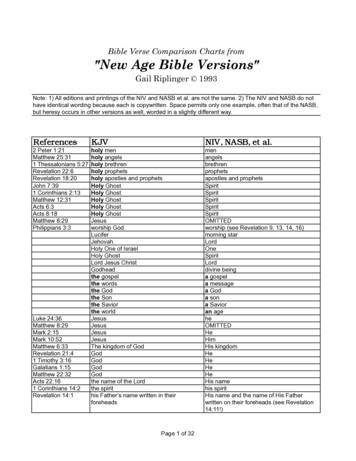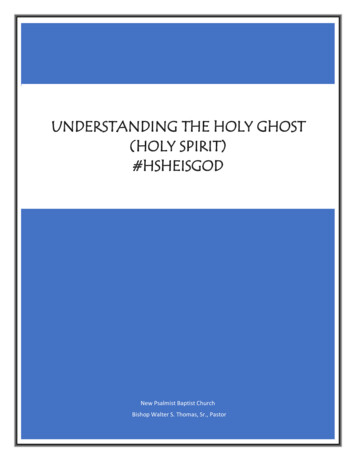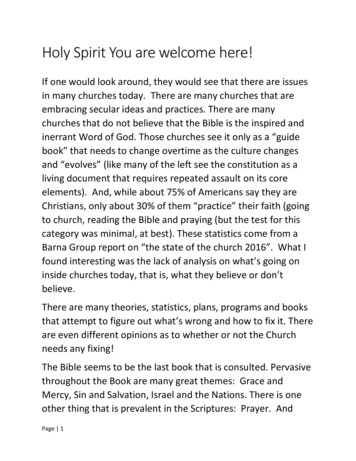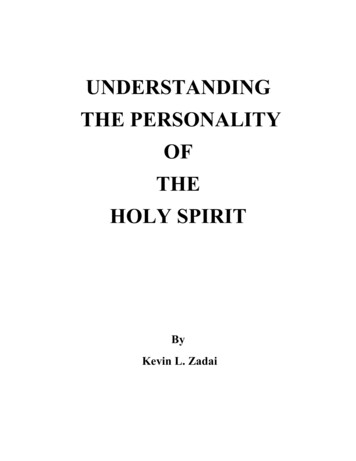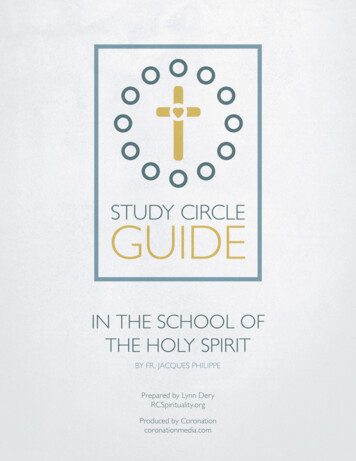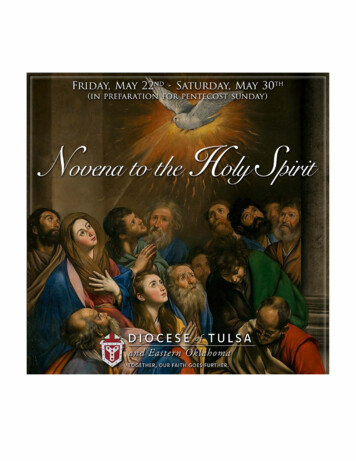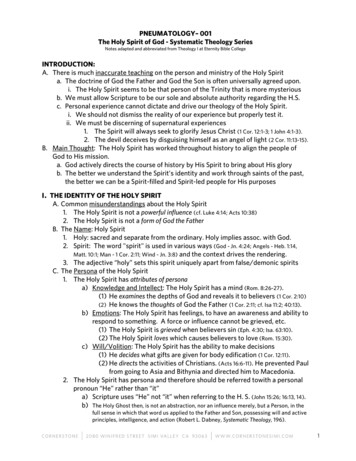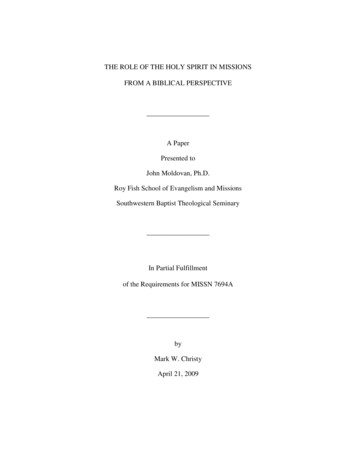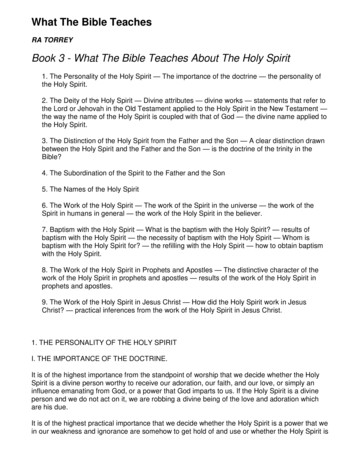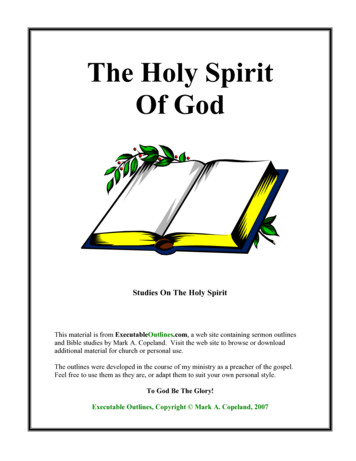
Transcription
The Holy SpiritOf GodStudies On The Holy SpiritThis material is from ExecutableOutlines.com, a web site containing sermon outlinesand Bible studies by Mark A. Copeland. Visit the web site to browse or downloadadditional material for church or personal use.The outlines were developed in the course of my ministry as a preacher of the gospel.Feel free to use them as they are, or adapt them to suit your own personal style.To God Be The Glory!Executable Outlines, Copyright Mark A. Copeland, 2007
Mark A. CopelandThe Holy Spirit Of GodTable Of ContentsAn Important Subject For Our Study3The Personality Of The Holy Spirit6The Deity Of The Holy Spirit9The Work Of The Holy Spirit13The Promise Of The Holy Spirit16The Baptism Of The Holy Spirit19The Gift Of The Holy Spirit24The Indwelling Of The Holy Spirit28The Leading Of The Holy Spirit33The Fruit Of The Holy Spirit38The Gifts Of The Holy Spirit40The Sins Against The Holy Spirit44Summary: The Holy Spirit, Then And Now48The Holy Spirit Of God2
Mark A. CopelandThe Holy Spirit Of GodAn Important Subject For Our StudyINTRODUCTION1. This lesson begins a series of studies on the Holy Spirit.a. One might ask, "Why such a study?"b. Is it important to spend several lessons dealing with this subject alone?2. An understanding and appreciation of the Holy Spirit is indeed important, and the purpose of thisintroductory lesson is to make sure we understand why[The value of studying about the Spirit is to be seen in noticing His prominence in several areas.]I. THE PROMINENCE OF THE SPIRIT IN "THE BIBLE"A. HIS MENTION IN THE OLD TESTAMENT.1. The O.T. mentions the Holy Spirit 88 times2. 23 books in the O.T. refer to the Holy Spirit3. Although the actual expression "Holy Spirit" is used only 3 times - e.g., Psa 51:114. Other expressions referring to the Spirit are used (e.g., "the Spirit of God") - Gen 1:2B. HIS MENTION IN THE NEW TESTAMENT.1. The N.T. mentions the Holy Spirit 264 times2. 60 or more references in the gospels3. Acts has 57 references (which is why some call it "The Acts Of The Holy Spirit")4. The epistles refer to the Holy Spirit 132 times5. Only 3 epistles make no mention of the Spirit (Philemon, 2 & 3 John)[To understand much of the Bible itself, one needs to understand (as much as humanly possible) such aprominent figure as the Holy Spirit! Imagine someone saying they understood the story of the Bible,but did not know much about Abraham! Note also.]II. THE PROMINENCE OF THE SPIRIT IN "THE LIFE OF CHRIST"A. HIS INVOLVEMENT IN THE BIRTH OF JESUS.1. Jesus was conceived of the Holy Spirit in the womb of Mary - Mt 1:20; Lk 1:30-352. Various individuals were filled with the Spirit to make pronouncements about His birtha. Elizabeth, mother of John the Baptist - Lk 1:41-42b. Zacharias, father of John the Baptist - Lk 1:67-79c. Simeon, who saw the infant Jesus when presented in the Temple - Lk 2:25-35B. HIS PRESENCE AT THE BAPTISM BY JOHN.1. Descended in bodily form like a dove - Lk 3:21-222. Even "alighting upon Him" - Mt 3:16C. HIS PRESENCE DURING THE TEMPTATIONS IN THE WILDERNESS.The Holy Spirit Of God3
Mark A. Copeland1. Jesus was "filled with the Holy Spirit" - Lk 4:12. He was "led by the Spirit" into the wilderness - Lk 4:1; Mt 4:1D. HIS POWER DURING JESUS' MINISTRY.1. Jesus returned from His temptations "in the power of the Spirit" to teach in the synagogues- Lk 4:14-152. He applied Isaiah's prophecy to Himself, which said "The Spirit of the LORD is upon Me."- Lk 4:16-213. On one occasion it is said that Jesus "rejoiced in the Spirit" - Lk 10:214. Jesus claimed to cast out demons by the power of the Holy Spirit - Mt 12:28[As Christians, can we really hope to grow in the knowledge of our Lord and Savior, without at least anelementary understanding of the Holy Spirit, so prominent in His earthly life? Consider also.]III. THE PROMINENCE OF THE SPIRIT IN "THE CHRISTIAN'S LIFE"A. HIS INVOLVEMENT IN OUR BECOMING CHRISTIANS.1. We are convicted of sin by the Holy Spirit - Jn 16:7-82. We are "born again" of the Spirit - Jn 3:5-83. We are "renewed" of the Holy Spirit - Ti 3:4-6B. HIS PRESENCE IN OUR LIVES AS CHRISTIANS.1. We "live in the Spirit" - Ga 5:25a2. We are to "walk in the Spirit", producing the "fruit of the Spirit" - Ga 5:25b,16-18,22-233. We must set our minds on "the things of the Spirit" - Ro 8:5-64. It is "by the Spirit you put to death the deeds of the body" - Ro 8:12-135. Only when "led by the Spirit" are we truly the "sons of God" - Ro 8:146. The Holy Spirit "makes intercession for us" in our prayers - Ro 8:26-277. God strengthens us "with might through His Spirit" in the inner man - Ep 3:168. Thus we can enjoy the "communion (fellowship) of the Spirit" - 2 Co 13:14; Ph 2:1[Future lessons will discuss these things in greater detail. Suffice it to say that since the Holy Spirit is soinvolved in our lives as Christians, it behooves us to understand the proper relationship we are to sustainwith the Spirit! Finally, the need to study what the Bible teaches concerning the Spirit is seen when weconsider.]IV. THE PROMINENCE OF THE SPIRIT REGARDING "TRUTH AND ERROR"A. HE IS THE SOURCE OF GOD'S TRUTH.1. The O.T. scriptures with their prophecies came through the agency of the Holy Spirit- 2 Pe 1:20-21; 1 Pe 1:10-112. Jesus told His apostles that the Holy Spirit would teach them "all things", and guide them"into all truth" - Jn 14:25-26; 16:12-133. There is no other way to know the truth of God's Will except by what the Holy Spiritrevealed to the apostles - 1 Co 2:10-13B. HE IS THE SUBJECT OF MUCH ERROR.1. Much error is taught about the nature of the Holy Spirita. Some think He is an impersonal force expressive of God's powerThe Holy Spirit Of God4
Mark A. Copelandb. Others think He is really Jesus in another form2. Many people misunderstand:a. The baptism of the Holy Spiritb. The gift of the Holy Spiritc. The spiritual gifts of the Holy Spiritd. The indwelling of the Holy Spirit3. Many attribute "impressions or "intuitive feelings" to being "led by the Spirit"a. Ignorant of how the Holy Spirit leads usb. Attributing to the "Holy Spirit" what is really the "human spirit"CONCLUSION1. It should be evident that our chosen subject is indeed an important one.a. As our understanding of the Holy Spirit increases, so will our appreciation for Himb. Our next study will consider what is revealed about the personality of the Holy Spirit2. As important as understanding the Holy Spirit might be.a. It is not essential to have a comprehensive knowledge of the Spirit to become a child of Godb. Any more than understanding the birth process when we were physically bornWhat is essential is that we respond to the terms of pardon revealed by the Holy Spirit in the gospel ofChrist - cf. Act 2:36-38The Holy Spirit Of God5
Mark A. CopelandThe Holy Spirit Of GodThe Personality Of The Holy SpiritINTRODUCTION1. The previous lesson introduced this series and stressed the importance of our study2. To what was said, I add the following statement:"There is no subject more important in religion than that of the Holy Spirit. Unless this be properlyunderstood, a large portion of the Bible, and especially the NT, must remain unintelligible. On theother hand, a just view of it will do more than a knowledge of any other particular topic to giveharmony, clearness, and consistency to what may be learned to all other matters presented in theWord of God." - The Office Of The Holy Spirit, Richardson3. Despite its importance to understanding the Scriptures as a whole, there is much confusion andsuperstition in the minds of many people about the Holy Spirit4. It is my intention in this series of lessons to present my understanding of what the Bible teachesabout the subject5. A good starting place is to consider who or what the Holy Spirit is.a. Is the Holy Spirit a person, one that possesses "personality"?b. Or is the Holy Spirit simply an "influence", or "impersonal force" that emanates from God?1) Members of the Watchtower Society (who call themselves "Jehovah's Witnesses"), wouldhave us believe such is the case2) E.g., "As for the 'Holy Spirit', the so-called 'third person of the trinity', we have already seenthat it is, not a person, but God's active force." - The Truth That Leads To Eternal Life6. It is my contention, however, that the Bible reveals the Holy Spirit to be.a. A "personal" being, possessing every trait of what we call "personality"b. Not some "impersonal force" that emanates from God[Consider the following evidence for this view of the Holy Spirit.]I. THE HOLY SPIRIT'S WORKS MANIFEST PERSONALITYA. THE HOLY SPIRIT SPEAKS.1. He "expressly says" that some will depart from the faith - 1 Ti 4:12. The Spirit spoke and gave directions to Philip - Ac 8:293. He spoke to Peter and gave him charge concerning the Gentiles - Ac 10:19-204. He spoke to the brethren at Antioch concerning Paul and Barnabas - Ac 13:1-4B. THE HOLY SPIRIT TEACHES.1. He was to teach the apostles all things - Jn 14:262. Please note that Jesus consistently refers to the Holy Spirit as "He", not "it" (implying apersonal being, not an impersonal force) - cf. Jn 14:16-17The Holy Spirit Of God6
Mark A. CopelandC. THE HOLY SPIRIT BEARS WITNESS.1. He was to testify of Jesus - Jn 15:26-272. Just as the apostles (who were "personal beings") would bear witness, so also the HolySpiritD. THE HOLY SPIRIT GUIDES, HEARS, SPEAKS, TELLS.1. He would carry on and complete the work started by Jesus - Jn 16:12-132. Notice again that Jesus consistently refers to the Holy Spirit as "He"E. THE HOLY SPIRIT FORBIDS.1. He prevented Paul and his companions from going into certain areas of Asia - Ac 16:6-72. This He did by "forbidding" them, and "not permitting" them, despite their initial effortsF. THE HOLY SPIRIT INTERCEDES.1. The "Spirit Himself (note Paul's use of the personal pronoun) makes intercession for us"- Ro 8:262. Just as Christ "also makes intercession for us" - Ro 8:34[All these works of the Holy Spirit manifest personality. But there is more.]II. THE HOLY SPIRIT POSSESSES PERSONAL CHARACTERISTICSA. HE HAS A MIND.1. "the mind of the Spirit" - Ro 8:272. This suggests thinking on His ownB. HE HAS KNOWLEDGE.1. He "knows the things of God" - 1 Co 2:112. Just as the "spirit of man" (a personal being) knows certain thingsC. HE POSSESSES AFFECTION.1. Paul speaks of "the love of the Spirit" - Ro 15:302. When have you known of an "impersonal force" that could love?D. HE HAS A WILL.1. "the same Spirit works all these things, distributing to each one individually as He wills"- 1 Co 12:112. It was the Holy Spirit Who decided what person received which gift[Again, these are all characteristics of a being possessing intelligence and personality. Finally,consider how.]III. THE HOLY SPIRIT SUFFERS PERSONAL SLIGHTS AND INJURIESA. HE CAN BE GRIEVED.1. "do not grieve the Holy Spirit of God" - Ep 4:302. He can be made sorrowful through our willful neglectThe Holy Spirit Of God7
Mark A. CopelandB. HE CAN BE BLASPHEMED.1. That is, to be spoken evil of2. As in attributing His deeds to the works of Satan, the "unforgivable sin" - Mt 12:31-32C. HE CAN BE INSULTED.1. One who has "trampled the Son of God underfoot" has also "insulted the Spirit of grace"- He 10:292. This is done by sinning "willfully" - He 10:26D. HE CAN BE LIED TO.1. As Ananias and his wife Sapphira were guilty of doing2. ".why has Satan filled your heart to lie to the Holy Spirit.?" - Ac 5:3E. HE CAN BE RESISTED.1. As Stephen charged the Jewish leaders of doing - Ac 7:512. This they did by resisting the message and persecuting the messengers who were inspired bythe Holy Spirit - cf. Ac 7:52-53CONCLUSION1. A mere principle or influence cannot sustain these slights, only a personal being; so it is clear.a. The Bible presents the Holy Spirit as a personal beingb. We should regard the Holy Spirit as a "He", not an "it"!2. But is this personal being also a supreme being?a. Angels are personal beings, but not supreme beingsb. What does the Bible say about the Holy Spirit?-- We will next study the deity of the Holy Spirit, and how it relates to the concept of God3. For now, have you considered your personal relationship to the Holy Spirit.?a. How He feels for you?b. What He has done, and is doing, for you in God's scheme of redemption?c. How He reacts to your reception or rejection of the Word He has revealed?4. Might you even be guilty of "resisting the Holy Spirit".?a. By resisting the commands of the apostles and prophets?b. "Who have preached the gospel to you by the Holy Spirit sent from heaven"? - 1 Pe 1:12; cf.Ac 2:36-38The Holy Spirit Of God8
Mark A. CopelandThe Holy Spirit Of GodThe Deity Of The Holy SpiritINTRODUCTION1. At this point in our study, we are simply trying to understand who or what the Holy Spirit is.a. Our last study concluded that the Holy Spirit is a personal being, and not some impersonalforce or powerb. We noted that His personality is manifested by:1) His works2) His characteristics3) His slights and injuries which He can suffer2. But what else can we learn from the Scriptures concerning His nature? In this lesson.a. We shall present evidence that illustrates His deityb. We shall try to reconcile the concept of the Holy Spirit as deity with the Biblical teachingthat there is only one God[Let's begin by noting the evidence that.]I. THE HOLY SPIRIT IS A DIVINE BEINGA. HIS "ATTRIBUTES" REVEAL HIS DIVINE NATURE.1. He is "omniscient" (knows all things) - 1 Co 2:10-112. He is "omnipresent" (everywhere) - Psa 139:7-103. He is called the "eternal" Spirit - He 9:14B. HIS "WORKS" REVEAL HIS DIVINE NATURE.1. He was involved in the "creation" of the world - Gen 1:2; cf. also Job 33:42. He was involved in the "working of miracles" - Mt 12:28; Ro 15:193. He was involved in the "redemption" of man - He 9:144. He is involved in the "regeneration" of man - Jn 3:5; Ti 3:4-6[All this supports thinking of the Holy Spirit as deity. In fact, Peter spoke of the Holy Spirit and Godinterchangeably in Ac 5:3-4,9. This makes sense only if the Holy Spirit is indeed God! But if the HolySpirit is a personal, divine being.- Does that mean the Bible teaches a polytheistic concept of God?- Are there three Gods, or only one God?- What relationship does the Holy Spirit maintain with the Father and with Jesus Christ?These questions that have challenged the minds of men throughout the ages. I don't pretend to set theissue at rest in one simple lesson. But here are some thoughts on the subject.]II. FOUR DIFFERENT CONCEPTS OF GODA. TRITHEISM.The Holy Spirit Of God9
Mark A. Copeland1. This view holds that there are three gods2. That is, that the "Father" is a god, the "Son" (Jesus) is a god, and the "Holy Spirit" is a god- three separate and distinct gods3. This is truly polytheism (a belief in more than one god)4. Mormons hold to a slight variation of this view, in that they do not limit it to just three gods,but believe there many more godsB. ARIANISM.1. Named after Arius, who lived in Alexandria in the fourth century A.D. and taught this view2. According to Arius.a. God the Father existed from eternityb. Jesus (God the Son) was created in time by the Fatherc. The Holy Spirit is a creation of the Son (therefore, a creature of a creature)3. Members of The Watchtower Society (who call themselves "Jehovah's Witnesses") holdsimilar views, believing that.a. Jesus is a created beingb. The Holy Spirit is just an impersonal force sent by God to accomplish His purposeC. SABELLIANISM.1. Named after Sabellius, who lived in the third century A.D.2. This view holds that God is one person.a. Who has manifested Himself in three different ways or three different modesb. Not simultaneously, but successively; for example.1) At one moment God presents Himself as Creator (or Father)2) At another moment, as Redeemer (or Son)3) Then again, as Revealer (or Holy Spirit)3. This view is held by many modern theologians, and by those who emphasize baptism in thename of Jesus "only" (United Pentecostal Church)D. TRINITARIANISM.1. This is the doctrine of the trinitya. The word trinity comes from the Latin "trinitas"b. From another Latin word, trinus, which means "threefold"c. Meaning a triad, or "group of three", suggesting both unity and diversity2. This view holds that God is one God.a. But that the one God exists eternally in three persons (Father, Son, Holy Spirit)b. That in this one God there is both unity and diversity:1) The unity consists, not in the unity of purpose only, but in one common nature, in thesameness of "Godhood"2) The diversity is seen in that the Father, Son, and Holy Spirit are distinguishable3. The doctrine of the trinity can be stated in three propositions.a. First, God is one Godb. Second, the Son is fully God and is distinct from God the Father and God the Spirit1) There is nothing in concept of God (deity), no quality, no attribute, which the Sondoes not possess2) Yet He is not the same person as the Father or the Spiritc. Third, the Spirit is fully God, is distinct from the Father and the Son, and is personala) The Spirit is not a created being or energy from God, but is deityb) He is different in His "person" and "mission" from the Father and the SonThe Holy Spirit Of God10
Mark A. Copeland4. This is the view held by most Catholics and Protestants today[Which of these four views is correct? Is the Holy Spirit.- a god (Tritheism)?- a creature or force emanating from God (Arianism)?- God in just another form, but not in any way distinct from the Father or Son (Sabellianism)?- God, but a distinct personality from the Father and Son who together make up the One TrueGod (Trinitarianism)?Not Tritheism for that is polytheistic, and the Bible teaches "Hear, O Israel: The Lord our God, the Lordis one!" (Deu 6:4) Let's consider, then.]III. WHAT THE BIBLE REVEALS ABOUT GODA. THE FATHER, SON AND HOLY SPIRIT ARE DISTINGUISHABLE.1. All were present, but in different forms, at Jesus' baptism - Mt 3:16-172. In His teaching about the Holy Spirit, Jesus clearly makes a distinction.a. "I (Jesus) will pray the Father, and He will give you another (note: another, not thesame) Helper (Holy Spirit), that He may abide with you forever." - Jn 14:16b. "But the Helper, the Holy Spirit, whom the Father will send in My (Jesus') name."- Jn 14:26c. "But when the Helper (Holy Spirit) comes, whom I (Jesus) shall send to you from theFather." - Jn 15:263. A distinction is made in the command to baptize people in the name "of the Father and ofthe Son and of the Holy Spirit" - Mt 28:194. Paul makes a distinction in his benediction in 2 Co 13:14a. "The grace of the Lord Jesus Christ."b. ".and the love of God."c. ".and the communion of the Holy Spirit."5. John refers to "both the Father and the Son" - 2 Jn 9a. Note the use of the word "both", which implies twob. How can you have "both" if they are exactly one and the same thing?-- This evidence rules out "Sabellianism" (or the "oneness" doctrine of the UPC)B. THE FATHER, SON, AND HOLY SPIRIT EACH POSSESS DEITY.1. The Father is clearly God (deity) - 1 Co 1:32. The Son is also God (deity) - cf. Jn 1:1-3,14; Mt 1:21-23; Ro 9:5; Ph 2:5-6; Co 2:9;1 Ti 6:14-16; He 1:8-123. The Holy Spirit also possesses deity (as noted earlier)-- This evidence makes "Arianism" untenable (or the view propagated by TheWatchtower Society, i.e., "Jehovah's Witnesses")C. THE TRINITARIAN VIEW IS SUPPORTED THROUGHOUT THE BIBLE.1. Suggested by a Hebrew name for God (Elohim) used throughout the OT - Gen 1:1a. The word "elohim" is plural in form, not singularb. The plurality of "personality" in one God is implied in the plural pronouns "us" and "our"in Gen 1:262. Even the covenant name of God (YHWH, Jehovah or Yahweh), is used at times to show aThe Holy Spirit Of God11
Mark A. Copelandplurality of "personalities" in the one Goda. Bear in mind that this name can only be applied to the one true God - Isa 42:8; 45:5b. Yet notice that this name is used in prophecy to refer to Jesus - Isa 40:3 (Mt 3:1-3)c. In at least two passages, when YHWH speaks, He says YHWH sent him!1) Notice carefully, Isa 48:12-16 and Zech 2:8-92) This indicates a plurality of personalities (i.e., Father, Son, and Holy Spirit)!3. The only way I know to be true to all of the Biblical evidence for the nature of God is todraw the conclusion suggested by the words in Deu 6:4a. There is one God - "The LORD (YHWH, or Jehovah)."b. But within this "Godhead" are three distinct personalities - ".our God (Elohim,suggesting plurality of some sort)"c. These three distinct personalities are one in substance, essence, purpose - "theLORD (YHWH) is one (in the sense of being united)"d. Yes, "Jehovah, our Elohim, is united Jehovah"!CONCLUSION1. Admittedly, trying to comprehend the nature of God is difficult.a. It is like trying to comprehend the infinite reaches of the universeb. With our finite minds, both are impossible2. For those who accept the Bible as inspired of God, we must.a. Let the Bible reveal the nature of God1) Accept what it reveals by faith2) Even when we cannot comprehend itb. Avoid developing a concept of God (and the Holy Spirit)1) Through humanistic and rationalistic thinking2) Twisting the Scriptures to fit such concepts3. I understand the Bible to reveal the Holy Spirit as.a. A distinct personality, possessing all the attributes of deityb. Yet one in essence, substance, and purpose with the Father and the Sonc. A member of what is called the "Godhead"; truly a "mind-boggling" concept!There is something else that should boggle our minds as well: the love God has for sinners! - cf. Ro5:6-11.The Holy Spirit Of God12
Mark A. CopelandThe Holy Spirit Of GodThe Work Of The Holy SpiritINTRODUCTION1. Thus far we have examined what the Bible reveals about the nature of the Holy Spirit.a. The Holy Spirit is a personal beingb. The Holy Spirit is a divine being-- I.e., He is the third Person in the Godhead2. At this point, it may be beneficial to review the work of the Holy Spirit.a. As manifested throughout the history of mankindb. As demonstrated throughout the revelation of God's redemption of man-- That we might increase our appreciation for the Holy Spirit[We begin by noting.]I. THE SPIRIT'S WORK IN CREATIONA. INVOLVED IN THE CREATION OF THE UNIVERSE.1. God used the Spirit in the creation of the world - Gen 1:2; Psa 104:302. God used the Spirit in the creation of the heavens - Job 26:13; Psa 33:6-- Clearly in conjunction with the work of the Son - cf. Jn 1:1-3; Co 1:16B. INVOLVED IN THE CREATION OF MAN.1. In the creation of the first man - Gen 1:26-272. In the creation of every man (as in the case of Elihu) - Job 33:4[From the very beginning, the Spirit was at work. His work continued, especially as God began toslowly reveal His plan of redemption for mankind.]II. THE SPIRIT'S WORK IN REVELATIONA. IN OLD TESTAMENT TIMES.1. The prophets of old spoke as they were moved by the Spirit - 2 Pe 1:20-21; e.g., 2 Sam23:22. The Spirit was in them, testifying of things to come - 1 Pe 1:10-11; e.g., Isa 53:4-6B. IN THE NEW TESTAMENT TIMES.1. The Spirit was to guide the apostles into all the truth - Jn 16:12-13; cf. 14:262. This the Spirit did - 1 Co 2:10-13; e.g., 1 Ti 4:1-3[Thus the Spirit's role in the redemption of man included His work of revealing the will of God. Inconjunction with the Spirit's work of revelation, we also read of.]III. THE SPIRIT'S WORK IN CONFIRMATIONThe Holy Spirit Of God13
Mark A. CopelandA. CONFIRMING JESUS AS THE CHRIST.1. Jesus was attested by God through the miracles He performed - Ac 2:222. The Spirit worked with Christ to confirm His work - Ac 10:38; cf. Mt 12:28; Lk 4:18-21B. CONFIRMING THE APOSTLES OF CHRIST.1. Confirming their message, through gifts given by the Spirit - He 2:3-42. As they traveled about proclaiming the gospel of God - e.g., Ro 15:19[As the Word of God was being revealed and confirmed, it was the Spirit of God at work! But as theWord was being preached, the Spirit was also at work on those who listened with good and honesthearts.]IV. THE SPIRIT'S WORK IN REGENERATIONA. AS THE WORD WAS PREACHED.1. The Spirit was doing His work of convicting the world - cf. Jn 16:82. For example, consider the events on the day of Pentecosta. The Spirit gave the apostles utterance - Ac 2:4b. Peter preached Christ to them - Ac 2:22-24,36c. People in the audience were convicted of their sins - Ac 2:37d. They were encouraged to repent and be baptized - Ac 2:38-39e. Those willing to do so, did so gladly - Ac 2:40-41-- Thus the Spirit convicts the world through His revealed and confirmed Word whenever it ispreached; those with good and honest hearts will bear the proper fruit - cf. Lk 8:15B. AS THE WORD WAS OBEYED.1. Those who obeyed the Spirit's Word were baptized - cf. Ac 2:38-412. In their baptism, they experienced a "washing of regeneration and renewing of the HolySpirit' - cf. Ti 3:5-7; 1 Co 6:11-- Thus they were being born again (regenerated) not of water only, but of water and the Spirit- cf. Jn 3:5[This work of regeneration by the Spirit in response to the preaching of the Word does not end the workof the Spirit in the life of the Christian. For we also read in the Bible of.]V. THE SPIRIT'S WORK IN SANCTIFICATIONA. IN OUR INITIAL SANCTIFICATION.1. Sanctification involves the idea of being "set apart", "consecrated"2. Sanctification began in conjunction with our washing and justification - 1 Co 6:113. This washing, sanctification, and justification occurred "by the Spirit of our God"-- In obedience to the Word of God, we are "sanctified" by the Spirit - cf. 2 Th 2:13B. IN OUR ONGOING SANCTIFICATION.1. Sanctification is an ongoing work - cf. He 2:11; 10:14a. Not in the sense of needing redemption - cf. He 10:10b. But in the sense of living holy lives - cf. 1 Th 4:3-4; 5:232. The Spirit plays an important role in living holy livesa. God strengthens us by His Spirit in our inner man - Ep 3:16; cf. 3:20The Holy Spirit Of God14
Mark A. Copelandb. It is with aid of the Spirit that we put to death the deeds of the body - Ro 8:11-13;cf. Co 3:5-9-- Thus the need to "walk in the Spirit" and be "led by the Spirit" - cf. Ga 5:16-18CONCLUSION1. In this brief survey we have seen the work of the Holy Spirit in regards to.a. Creationb. Revelationc. Confirmationd. Regeneratione. Sanctification2. My purpose has not been to provide an exhaustive survey.a. The Lord willing, future lessons will expand on some of the themes mentioned in this studyb. My goal is to remind ourselves how blessed we are through the Spirit's work in our lives3. How important is the work of the Spirit.?a. Our very being (physical creation) is the result of the Spirit's workb. Our eternal destiny (spiritual regeneration) is dependent upon the Spirit's workSadly, many people resist the work of the Spirit in their lives. This occurs whenever one refuses to obeythe Word of God revealed and confirmed by the Spirit (cf. Ac 7:51-53).How much better to obey the truth, and be born again by the Spirit working through that "incorruptibleseed", the Word of God! - cf. 1 Pe 1:22-23The Holy Spirit Of God15
Mark A. CopelandThe Holy Spirit Of GodThe Promise Of The Holy SpiritINTRODUCTION1. In our previous lesson we surveyed the work of the Holy Spirit in regards to.a. Creationb. Revelationc. Confirmationd. Regeneratione. Sanctification2. It is evident that the Holy Spirit has been at work throughout.a. The history of mankindb. The redemption of mankind3. Of special interest is the working of the Holy Spirit in the life of a Christian.a. An area of study in which many have questionsb. An area in which there is great diversity of views[A good place to begin might be the promise of the Holy Spirit. Long before Jesus came, God beganmaking promises about the Spirit .]I. THE PROMISE OF THE SPIRIT IN THE OLD TESTAMENTA. THE PROPHECY OF JOEL.1. Recorded in Joel 2:28-32 (ca. 800 B.C.)2. The elements of this prophecy included:a. The Spirit being poured out on all flesh - Joel 2:28b. Sons and daughters of Israel prophesying , and Israel's young and old men seeingvisions and dreaming dreams (note “your”) - Joel 2:28c. God's Spirit being poured out upon His menservants and maidservants (includingGentiles?) and their prophesying - Joel 2:293. This prophecy began to be fulfilled on the Day of Pentecost after the Ascension of Christa. When the Holy Spirit came upon the apostles in Jerusalem - Ac 2:1-4b. Who enabled them to speak in foreign languages - Ac 2:4-13c. Note that Peter ties the events of that day with Joel's prophecy - Ac 2:15-21-- It will be necessary to consider other passages to determine the full extent of the nature ofthis outpouring of the Spirit and its ramifications for todayB. THE PROPHECIES OF ISAIAH.1. One recorded in Isa 44:3-5 (ca. 750 B.C.)2. Elements of this prophecy include:a. God pouring His Spirit upon Israel's descendants - Isa 44:3b. Connecting the promise of the Spirit with the figure of water given to him who isthirsty - cf. Jn 7:37-393. Another prophecy that might relate to the promise of the Spirit - Isa 32:15-17a. Found in a section that appears to have Messianic implications - cf. Isa 32:1b. The result of this pouring of the Spirit: justice, righteousness, and peace - cf. Ro 14:17The Holy Spirit Of God16
Mark A. CopelandC. THE PROPHECIES OF EZEKIEL.1. One recorded in Ezek 36:26-27 (ca. 592 B.C.)2. Elements of this prophecy:a. God promises to put His Spirit “within you” (an indwelling)b. It will cause (enable) one to walk in His statutes and keep His judgments - cf. Ro8:11-13; Ep 3:163. Another prophecy that might relate to the promise of the Spirit - Ezek 39:29a. A prophecy that looks beyond the captivity and restoration of Israelb. One that might not have been fulfilled until the coming of the MessiahD. THE PROPHECY OF
Feel free to use them as they are, or adapt them to suit your own personal style. . The Holy Spirit Of God 2 The Holy Spirit Of God Table Of Contents An Important Subject For Our Study 3 The Personality Of The Holy Spirit 6 . The O.T. mentions the Holy Spirit 88 times 2. 23 books
